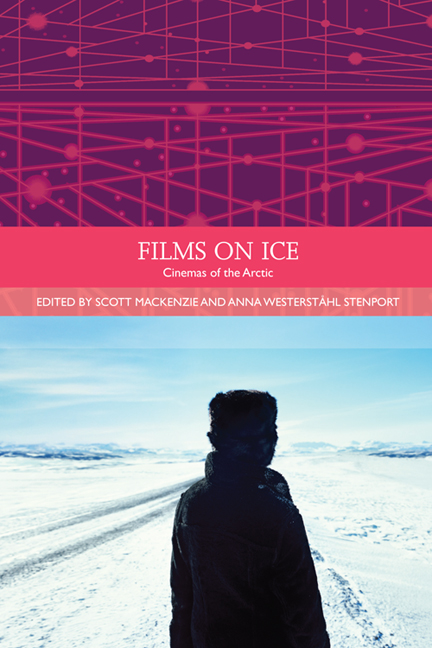Book contents
- Frontmatter
- Contents
- List of Illustrations
- Acknowledgements
- Traditions in World Cinema
- Introduction: What are Arctic Cinemas?
- PART I GLOBAL INDIGENEITY
- PART II HOLLYWOOD HEGEMONY
- PART III ETHNOGRAPHY AND THE DOCUMENTARY DILEMMA
- 14 The Creative Treatment of Alterity: Nanook as the North
- 15 From Objects to Actors: Knud Rasmussen's Ethnographic Feature Film The Wedding of Palo
- 16 Arctic Travelogues: Conquering the Soviet North
- 17 A Gentle Gaze on the Colony: Jette Bang's Documentary Filming in Greenland 1938–9
- 18 Exercise Musk-Ox: The Challenges of Filming a Military Expedition in Canada's Arctic
- 19 The Tour: A Film About Longyearbyen, Svalbard. An Interview with Eva la Cour
- PART IV MYTHS AND MODES OF EXPLORATION
- Notes on the Contributors
- Index
18 - Exercise Musk-Ox: The Challenges of Filming a Military Expedition in Canada's Arctic
from PART III - ETHNOGRAPHY AND THE DOCUMENTARY DILEMMA
Published online by Cambridge University Press: 05 September 2016
- Frontmatter
- Contents
- List of Illustrations
- Acknowledgements
- Traditions in World Cinema
- Introduction: What are Arctic Cinemas?
- PART I GLOBAL INDIGENEITY
- PART II HOLLYWOOD HEGEMONY
- PART III ETHNOGRAPHY AND THE DOCUMENTARY DILEMMA
- 14 The Creative Treatment of Alterity: Nanook as the North
- 15 From Objects to Actors: Knud Rasmussen's Ethnographic Feature Film The Wedding of Palo
- 16 Arctic Travelogues: Conquering the Soviet North
- 17 A Gentle Gaze on the Colony: Jette Bang's Documentary Filming in Greenland 1938–9
- 18 Exercise Musk-Ox: The Challenges of Filming a Military Expedition in Canada's Arctic
- 19 The Tour: A Film About Longyearbyen, Svalbard. An Interview with Eva la Cour
- PART IV MYTHS AND MODES OF EXPLORATION
- Notes on the Contributors
- Index
Summary
Canada's Arctic has always attracted explorers to its vast expanses to stake claims or to study its natural resources and its people. Motion picture film has played an important role in documenting those who have ventured to frozen lands to explore Northern regions. In films shot by either amateur or professional filmmakers, the common theme is often one of survival. This paper explores the journey of members of the British-Canadian Arctic Expedition (1936–40), and Exercise Musk-Ox (1946), who under very challenging conditions braved the elements, along with their motion picture cameras, just as many explorers who came before and after them.
The British-Canadian Arctic Expedition was sponsored by the University of Cambridge, England, to survey parts of Canada's Eastern Arctic (the coasts of Foxe Basin, Northern Baffin Island). Surveyor Tom Manning, geographer Patrick Baird, archaeologist Graham Rowley and others participated in the expedition. Relying heavily on the knowledge imparted by the Inuit inhabitants ensured their survival in the Arctic. Living off the land and adapting to the climate was a part of daily life.
The use of technology in the Arctic winter cold proved particularly challenging. In the National Film Board (NFB) production, Along Uncharted Shores (David Bairstow, Canada, 1964), the three surviving members of the British-Canadian Arctic Expedition share their experience and recount having to ‘warm up the radio and batteries over a seal oil lamp before you could get a time signal, and get a proper astronomical fix for control of the survey’. Often, they encountered cold and blustery snowy conditions, limiting their ability to record activities on motion picture film. Technical difficulties included condensation forming on the camera lens, and parts that would not properly function in freezing temperatures. Frequent opening of the camera to change 100-foot rolls of film exposed their fingers to frostbite. In Patrick Baird's expedition diary, he laments about the climate and the challenges of handling 16mm film reels while shooting a rare walrus hunt: ‘Now came the trouble of getting him (walrus) out. Alas my one film (fool!) was finished … A very successful day but I wish I had taken spare films tho’ changing will be difficult in this cold weather’ (Baird n.d.).
- Type
- Chapter
- Information
- Films on IceCinemas of the Arctic, pp. 245 - 254Publisher: Edinburgh University PressPrint publication year: 2014



